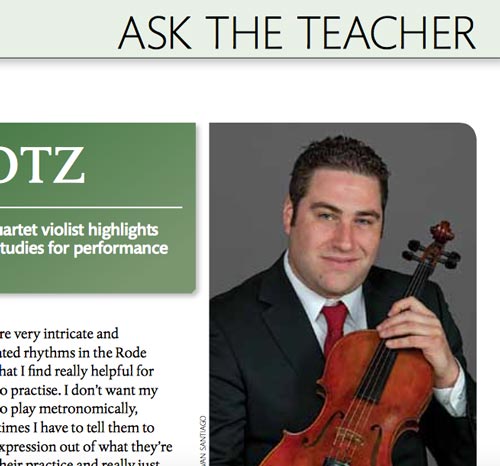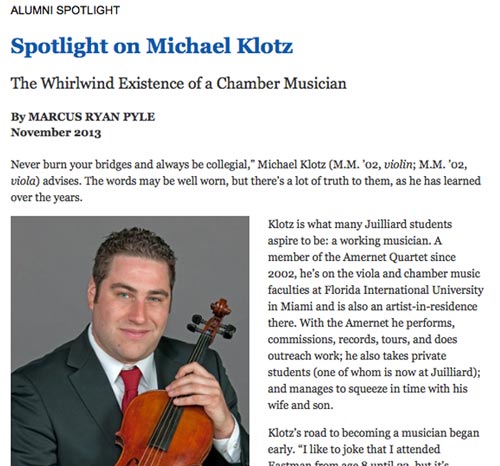Teaching
Michael Klotz is a dedicated pedagogue. As Teaching Professor of Viola and Chamber Music and Artist-in-Residence at Florida International University since 2004, he maintains a high level of international students from the US, Ireland, South and Central America, Mexico, Canada, and Israel. For more information about studying with Michael Klotz at FIU please visit: www.carta.fiu.edu/music.
Michael Klotz also accepts a limited number of award-winning private violin and viola students. Recent high school students have been accepted with substantial scholarships to prestigious schools of music such as the Curtis Institute of Music, The Juilliard School, Cleveland Institute of Music, New England Conservatory, Indiana University Jacobs School of Music, and the University of Michigan School of Music. Michael’s students consistently win awards nationally and internationally and are accepted to the most prestigious summer music festivals worldwide.
Since 2002, Michael Klotz has had the good fortune to teach and mentor some of today’s most outstanding viola and violin players. Michael prides himself on the success of his students. Former students include:
Wesley Collins — Principal Viola, The Cleveland Orchestra
Milena Pajaro van de Stadt — founding violist, Dover Quartet. First prize winner, Lionel Tertis Competition
Elizabeth Oka — Assistant Principal Viola, Kennedy Center Opera House
Joshua Newburger — Principal Viola, Rochester Philharmonic Orchestra
Gabriel Napoli — viola, Cincinnati Symphony Orchestra
Erica Gailing — viola, Baltimore Symphony Orchestra
Stephanie Block — Principal Viola, Sarasota Orchestra
Aiveen Gallagher — faculty, James Madison University
Michael Davis — violist, Princeton Symphony Orchestra, frequent substitute with New Jersey Symphony and New York City Ballet
Brett Walfish — founder and Executive Director, Rushmore Music Festival
Daniel Lamas — Director, Lamas String Studio, New York City
Interested in scheduling a lesson with Michael?
Spotlight: Articles and Interviews
Teaching Statement
I believe that a student must possess technical and intellectual skill when approaching a work of music. For example, if a student of mine is studying a work of Mozart, I direct them to learn other works of Mozart by listening and following the score. They should be able to discuss the work they are studying from a historical standpoint (year the work was written, other significant works written around that time) and must be able to recognize and discuss any pertinent structural and theoretical elements of the work. When working on intonation, I often have the students sing a passage, paying close attention to the intervals and being able to temper the intervals ever so slightly to show tonal flexibility. This helps the expressive component of a work and indeed increases the student’s sensitivity toward their intonation.
Career guidance and mentoring are integral parts of the teacher’s responsibilities toward their students. At the graduate level, students are at a crucial point where they will soon enter the work force or continue their studies toward an advanced degree, or both. I draw from my vast network of contacts locally, nationally, and internationally to assist my students in any way I possibly can. My commitment to my students continues beyond their studies at FIU or in my private studio. I continue to mentor and guide my students toward successful careers in music after graduation. I feel that my students’ success in the music world is essential for my continued success as a pedagogue.


